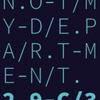Romantic Hackers
Anne Marggraf-Turley & Prof. Richard Marggraf-Turley
In 1791, the political reformer Jeremy Bentham theorized the Panopticon, whose design promised to allow a single Inspector to surveil (exercise "inspective force" over) large numbers of criminals or workers. In recent years, the advent of a suitable technical apparatus – CCTV, ISP taps (network traffic interception), data banks, and so on – has extended the proposed 30m circumference of Bentham’s structure to, and beyond, the physical boundaries of entire countries. While total surveillance is often perceived as a feature of modernity, its conceptual and epistemological framework is rooted in the Romantic period, moreover at a key juncture in the history of ideas concerning individual subjectivity, rights and freedoms. David Barnard-Wills refers to inspective culture as a "nexus of surveillance, identity and language" (2012). In this talk, we examine this nexus in the historical period that first, and so powerfully, imagined the fully surveilled world.
